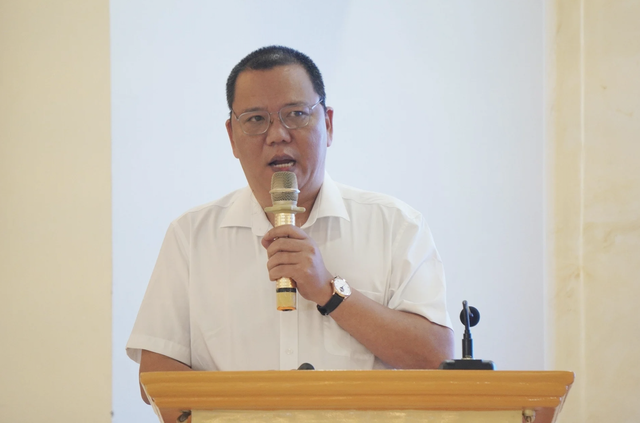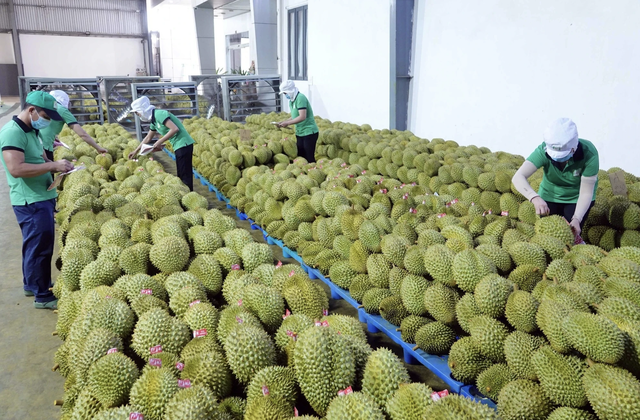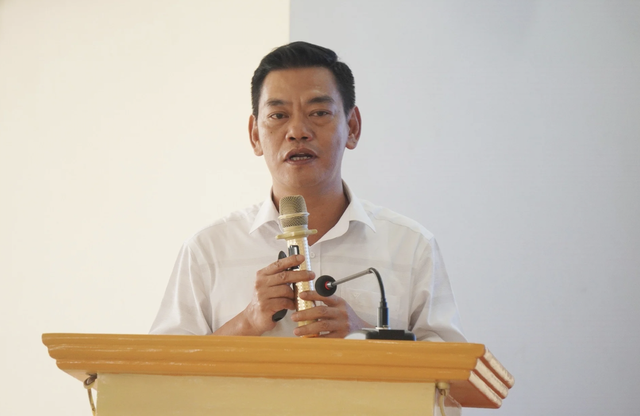According to the representative of the Vietnam SPS Office, the EU’s increase in the number of warnings has contributed to the increase in the frequency of border inspections of agricultural products in recent times.
To help the agricultural sector escape the state of hesitation
In the first 6 months of 2024, the EU’s announcement of changes and draft sanitary and phytosanitary measures (SPS) in the first 6 months of 2024 increased by nearly 20%, the most among Vietnam’s agricultural trade partners. In contrast, some markets such as China have almost no announcements.
This is the information provided by Mr. Ngo Xuan Nam – Deputy Director of the Vietnam SPS Office at the Conference “Strengthening the implementation of regulations and commitments on food safety and animal and plant quarantine in the EVFTA Agreement, the RCEP Agreement and solutions to ensure food safety and animal and plant disease safety in agricultural and food trade” on the morning of August 2.

According to Mr. Nam, since 2000, countries in the Asia-Pacific region have tended to increase notifications, from less than 250 notifications (in 2000) to more than 1,100 notifications (in 2022).
In addition, Vietnam’s main partners in agricultural, forestry, fishery and food export trade such as the EU, the United States, Japan, South Korea and China are the places with the most notifications, accounting for more than 60%.
“What is worrying is that in the first 6 months of the year, the number of warnings from the EU has increased abnormally. Specifically, Vietnam received 57 warnings in the first half of the year, while in the same period in 2023, there were 31 warnings. Of these, Ho Chi Minh City accounted for the most, with 23 warnings,” said Mr. Nam.
The EU’s increase in the number of warnings has contributed to an increase in the frequency of border checks of agricultural products. “This trend may continue to increase if we do not have timely solutions,” Mr. Nam shared.
Analyzing the reasons for the unusual increase in the number of warnings, the Deputy Director of the SPS Office said that there were both subjective and objective reasons. On the subjective side, exporting enterprises have not really complied with the regulations of importers because the MRL level for each active ingredient in each country is different. This requires in-depth research and understanding of science and technology.
In addition, according to previous habits, producers in some places do not have measures and plans to use pesticides, antibiotics, and fertilizers that are not in accordance with instructions.

In addition, Mr. Nam commented that the monitoring rate of growing area codes and packaging facilities has not been achieved. For example, durian is only monitored in 52% of growing areas and 47% of packaging facilities.
“There is no other way but to strengthen the connection in the direction of co-management of food safety and quality, contributing to standardization right from the input materials. Only when each stage fulfills its responsibilities, can Vietnamese agriculture escape the fear of changes in the import market,” Mr. Nam emphasized.
A wide playground from free trade agreements
Speaking at the event, Mr. Le Thanh Hoa – Director of the Vietnam SPS Office said: “Vietnam’s participation in the World Trade Organization (WTO) and free trade agreements such as EVFTA, RCEF … has created a fairer and wider playground than before with major partners such as East Asia and European countries”.

Mr. Hoa commented that free trade agreements create tax advantages, especially reducing tax lines to 0% for fresh and processed agricultural products, creating favorable opportunities for Vietnamese enterprises in the coming time, especially suitable for Vietnamese enterprises to invest in deeply processed agricultural products and food.
Mr. Luong Ngoc Quang – International Cooperation & Communications Department, Plant Protection Department, Ministry of Agriculture and Rural Development said that SPS regulations in the RCEP Agreement are based on 6 criteria, including: Compliance with international regulations, risk assessment based on science, transparency, encouragement of mutual recognition methods, cooperation and application of technology in certification.
Quarantine measures are introduced by countries to prevent harmful or dangerous pests or food safety hazards, while avoiding risks at ports in importing countries, promoting customs clearance speed.
“Each country has its own regulations on safety standards and plant quarantine. Compliance helps export goods be accepted in the importing country, avoiding warnings or import restrictions,” said Mr. Quang.

In the field of plant protection, compliance with the growing area code and packaging facility is the most important. This is a mandatory requirement when exporting goods but is not mandatory for domestic products.
Meanwhile, the EU, despite the tariff reduction under EVFTA, is particularly concerned about residue levels. If a pesticide has not been set MRL by the EU and is not in the database, the default level of 0.01 mg/kg will be applied.
Representing the voice of businesses, Mr. Dang Phuc Nguyen – General Secretary of the Vietnam Fruit and Vegetable Association commented: “The export value of Vietnamese fruits and vegetables to Korea and Japan is increasingly increasing. In addition to building brands and positions in the traditional Chinese market, the fruit and vegetable industry in particular and Vietnamese agricultural products in general need to diversify their markets further”.
Mr. Nguyen said that Japan and Korea are both members of the RCEP Agreement. Exporting enterprises not only benefit from tariffs but also reduce transportation and logistics costs when exporting to distant markets such as the EU and the United States.
